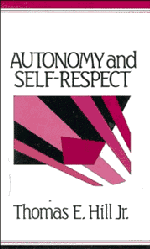Book contents
- Frontmatter
- Contents
- Sources and acknowledgments
- Introduction
- 1 Servility and self-respect
- 2 Self-respect reconsidered
- 3 Autonomy and benevolent lies
- 4 The importance of autonomy
- 5 Symbolic protest and calculated silence
- 6 Moral purity and the lesser evil
- 7 Self-regarding suicide: a modified Kantian view
- 8 Ideals of human excellence and preserving natural environments
- 9 Weakness of will and character
- 10 Promises to oneself
- 11 Social snobbery and human dignity
- 12 Pains and projects: justifying to oneself
- 13 The message of affirmative action
- Index
7 - Self-regarding suicide: a modified Kantian view
Published online by Cambridge University Press: 05 June 2012
- Frontmatter
- Contents
- Sources and acknowledgments
- Introduction
- 1 Servility and self-respect
- 2 Self-respect reconsidered
- 3 Autonomy and benevolent lies
- 4 The importance of autonomy
- 5 Symbolic protest and calculated silence
- 6 Moral purity and the lesser evil
- 7 Self-regarding suicide: a modified Kantian view
- 8 Ideals of human excellence and preserving natural environments
- 9 Weakness of will and character
- 10 Promises to oneself
- 11 Social snobbery and human dignity
- 12 Pains and projects: justifying to oneself
- 13 The message of affirmative action
- Index
Summary
Moral debates about suicide typically focus on the questions of whether suicide is immoral and whether we should interfere with suicide attempts. These questions naturally turn attention to matters such as conflicting rights, social consequences, religious belief, and the difficulty of drawing a sharp line between right and wrong in complex cases. My concern will be somewhat different. I want to consider what ideals of attitude toward human life and death may lie behind the common intuition that some suicides are morally objectionable, to some degree, even though not harmful to others and not a violation of anyone's rights.
The puzzling cases arise when the suicide is not failing in his obligations to others, but lacks any overriding moral reason to take his life. He is within his rights and yet his decision still seems morally significant. The issue is not whether suicide is strictly immoral, still less how a sharp line can be drawn between the permissible and the impermissible. The question, rather, is how an ideal person would view such choices. Or, in other words, what sort of attitudes toward life and death do we, from a moral point of view, want to encourage and see present in those who are moved to consider suicide?
My suggestion will be that to explain certain common intuitive beliefs on this question we need to move beyond consideration of rights and utility to a qualified Kantian principle about the value of life as a rational autonomous agent.
- Type
- Chapter
- Information
- Autonomy and Self-Respect , pp. 85 - 103Publisher: Cambridge University PressPrint publication year: 1991
- 6
- Cited by



